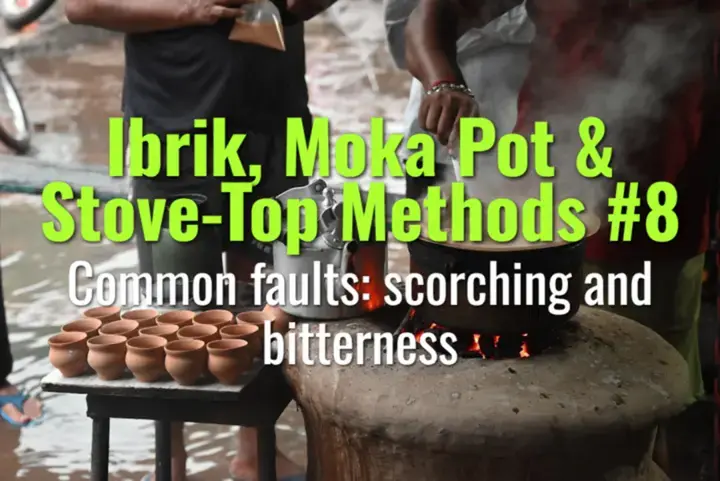Common faults: scorching and bitterness
The common faults in ibrik and Moka pot brewing that lead to scorching and bitterness, and how to prevent them.
- Coffee Basics Nerds
- 2 min read
Article 8 of 12 in Ibrik, Moka Pot & Stove-Top Methods/

Scorching in Moka Pot & Ibrik
- Cause: Grounds exposed to excessive direct heat or prolonged steam before water flows properly.
- Moka Pot: Happens when using high flames, causing violent surges and burning the puck.
- Ibrik: Occurs if coffee is boiled instead of gently heated, breaking down delicate aromatics.
- Result: Harsh, smoky, or ashy flavors.
Bitterness in Stove-Top Coffee
- Over-Extraction: Fine grind, long contact time, or overheating extracts bitter compounds.
- Reheating: Leaving brewed coffee on the stove further degrades flavors.
- Dirty Equipment: Coffee oils left in chambers burn and add bitterness.
Practical Fixes
- Heat Control:
- Always use low to medium heat.
- For Moka, remove pot as soon as gurgling starts.
- For ibrik, stop heating at foam rise, never rolling boil.
- Proper Grind:
- Moka: medium-fine (not espresso-fine).
- Ibrik: ultrafine, but avoid powdery dust that burns easily.
- Preheated Water (Moka):
- Reduces steam exposure time, preventing scorching.
- Cleanliness:
- Regularly clean valves, baskets, and chambers to avoid rancid oil buildup.
Sensory Clues
- Scorched Coffee: Tastes burnt, flat, sometimes metallic.
- Bitter Coffee: Lingers harshly on tongue, masking sweetness and acidity.
Summary
The main faults in Moka pot and ibrik brewing come from too much heat and over-extraction, resulting in scorching and bitterness. Gentle heating, correct grind size, clean equipment, and timely removal from heat ensure a smooth, aromatic, and balanced cup.